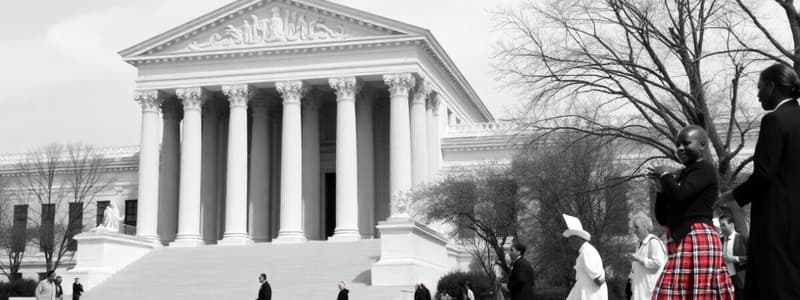Podcast
Questions and Answers
What was the primary argument made by Arkansas officials regarding desegregation?
What was the primary argument made by Arkansas officials regarding desegregation?
- Desegregation was mandated by the Supreme Court.
- Desegregation would lead to violence. (correct)
- Desegregation had already been implemented.
- Desegregation would improve education for all children.
The Supreme Court in Cooper v. Aaron supported Arkansas's refusal to comply with desegregation orders.
The Supreme Court in Cooper v. Aaron supported Arkansas's refusal to comply with desegregation orders.
False (B)
What major principle did the Supreme Court establish regarding judicial interpretations in Cooper v. Aaron?
What major principle did the Supreme Court establish regarding judicial interpretations in Cooper v. Aaron?
Judicial supremacy.
In Cooper v. Aaron, the Supreme Court referenced _____ v. Madison to support its ruling on judicial supremacy.
In Cooper v. Aaron, the Supreme Court referenced _____ v. Madison to support its ruling on judicial supremacy.
What did Cooper v. Aaron suggest about government officials and Supreme Court interpretations?
What did Cooper v. Aaron suggest about government officials and Supreme Court interpretations?
Match the following cases with their main issues:
Match the following cases with their main issues:
What was the significant procedural twist in Ex Parte McCardle?
What was the significant procedural twist in Ex Parte McCardle?
McCardle's challenge was based on his status as a military official.
McCardle's challenge was based on his status as a military official.
What action did Congress take regarding the 1867 jurisdictional provision?
What action did Congress take regarding the 1867 jurisdictional provision?
The Supreme Court maintains absolute jurisdiction over all appeals, regardless of Congressional actions.
The Supreme Court maintains absolute jurisdiction over all appeals, regardless of Congressional actions.
What are the three requirements established in Lujan v. Defenders of Wildlife for standing?
What are the three requirements established in Lujan v. Defenders of Wildlife for standing?
The Supreme Court's dismissal of McCardle’s appeal was due to lack of __________.
The Supreme Court's dismissal of McCardle’s appeal was due to lack of __________.
Match the following Supreme Court cases to their relevant concepts:
Match the following Supreme Court cases to their relevant concepts:
In Lujan v. Defenders of Wildlife, what was the primary reason the Court did not find standing?
In Lujan v. Defenders of Wildlife, what was the primary reason the Court did not find standing?
The requirements for standing in federal court can be entirely defined by Congress.
The requirements for standing in federal court can be entirely defined by Congress.
What does the term 'Injury in Fact' refer to in the context of standing?
What does the term 'Injury in Fact' refer to in the context of standing?
The __________ Clause allows Congress to make exceptions to the Supreme Court's appellate jurisdiction.
The __________ Clause allows Congress to make exceptions to the Supreme Court's appellate jurisdiction.
Which of the following concepts was emphasized by Chief Justice Chase in Ex parte McCardle?
Which of the following concepts was emphasized by Chief Justice Chase in Ex parte McCardle?
The doctrine of standing allows anyone to bring a case to federal court without demonstrating a personal stake.
The doctrine of standing allows anyone to bring a case to federal court without demonstrating a personal stake.
What was the main argument against the standing of the plaintiffs in Lujan?
What was the main argument against the standing of the plaintiffs in Lujan?
A proposal in Congress to strip the Supreme Court of jurisdiction is typically related to __________.
A proposal in Congress to strip the Supreme Court of jurisdiction is typically related to __________.
Which justices agreed that Congressional intent could define injuries to some degree in Lujan?
Which justices agreed that Congressional intent could define injuries to some degree in Lujan?
What principle is illustrated by Cooper v. Aaron?
What principle is illustrated by Cooper v. Aaron?
What was the main legal issue addressed in Ex Parte McCardle?
What was the main legal issue addressed in Ex Parte McCardle?
Lujan v. Defenders of Wildlife focuses primarily on judicial supremacy.
Lujan v. Defenders of Wildlife focuses primarily on judicial supremacy.
What does the term 'standing' refer to in the context of constitutional law?
What does the term 'standing' refer to in the context of constitutional law?
Cooper v. Aaron affirmed that the Constitution is the _____ of the land.
Cooper v. Aaron affirmed that the Constitution is the _____ of the land.
Which case demonstrated that Congress can limit the Supreme Court's jurisdiction?
Which case demonstrated that Congress can limit the Supreme Court's jurisdiction?
Match the key concepts to their corresponding cases:
Match the key concepts to their corresponding cases:
Judicial supremacy allows the Court to have the final word in interpreting the Constitution.
Judicial supremacy allows the Court to have the final word in interpreting the Constitution.
What constitutional article primarily governs the judicial branch?
What constitutional article primarily governs the judicial branch?
The principle of _____ refers to the ability of Congress to restrict the Supreme Court's appellate jurisdiction.
The principle of _____ refers to the ability of Congress to restrict the Supreme Court's appellate jurisdiction.
In Cooper v. Aaron, which document takes precedence over state laws?
In Cooper v. Aaron, which document takes precedence over state laws?
All justices agreed on the decision in Cooper v. Aaron.
All justices agreed on the decision in Cooper v. Aaron.
What effect did Lujan v. Defenders of Wildlife have on the Court's involvement in policy issues?
What effect did Lujan v. Defenders of Wildlife have on the Court's involvement in policy issues?
The concept of _____ helps to self-regulate how the Court manages its docket.
The concept of _____ helps to self-regulate how the Court manages its docket.
Which case directly enforced civil rights against state resistance?
Which case directly enforced civil rights against state resistance?
What is one of the three elements required for standing according to Justice Scalia's opinion?
What is one of the three elements required for standing according to Justice Scalia's opinion?
Justice Blackmun agreed with the strict requirements of standing laid out by Justice Scalia.
Justice Blackmun agreed with the strict requirements of standing laid out by Justice Scalia.
What did Justice Stevens argue regarding the application of the Endangered Species Act?
What did Justice Stevens argue regarding the application of the Endangered Species Act?
Justice Scalia's opinion emphasizes that a __________ violation without a concrete injury cannot confer standing.
Justice Scalia's opinion emphasizes that a __________ violation without a concrete injury cannot confer standing.
Match the justice with their view on standing:
Match the justice with their view on standing:
According to Justice Scalia, what must be demonstrated alongside an injury for standing?
According to Justice Scalia, what must be demonstrated alongside an injury for standing?
Congress can define injuries under the standing rules but must specify the injury it seeks to vindicate.
Congress can define injuries under the standing rules but must specify the injury it seeks to vindicate.
What does Justice Blackmun criticize regarding the majority's interpretation of redressability?
What does Justice Blackmun criticize regarding the majority's interpretation of redressability?
The three elements of standing are injury in fact, __________, and redressability.
The three elements of standing are injury in fact, __________, and redressability.
Match the case with its significance:
Match the case with its significance:
What did Justice Kennedy express about future cases in relation to standing?
What did Justice Kennedy express about future cases in relation to standing?
Justice Stevens concurred in his judgment due to his belief that plaintiffs lacked standing.
Justice Stevens concurred in his judgment due to his belief that plaintiffs lacked standing.
What does the 'irreducible constitutional minimum of standing' include?
What does the 'irreducible constitutional minimum of standing' include?
Justice Blackmun argued that the requirement for a __________ description of future plans is an empty formality.
Justice Blackmun argued that the requirement for a __________ description of future plans is an empty formality.
What does Justice Blackmun argue about legislative authority in relation to the majority opinion?
What does Justice Blackmun argue about legislative authority in relation to the majority opinion?
Flashcards
Cooper v. Aaron (1958)
Cooper v. Aaron (1958)
The Supreme Court ruled that state officials are bound by its interpretation of the Constitution, even if they disagree with it.
Order vs. Rights Argument
Order vs. Rights Argument
The legal argument that states can choose to ignore federal court orders if they believe it's necessary to maintain order.
Judicial Supremacy
Judicial Supremacy
The principle that the Supreme Court's interpretation of the Constitution is the 'supreme law of the land' and all government officials must follow it.
Marbury v. Madison
Marbury v. Madison
Signup and view all the flashcards
Ex Parte McCardle (1869)
Ex Parte McCardle (1869)
Signup and view all the flashcards
Jurisdictional Power of Congress
Jurisdictional Power of Congress
Signup and view all the flashcards
Habeas Corpus
Habeas Corpus
Signup and view all the flashcards
Reconstruction
Reconstruction
Signup and view all the flashcards
Constitutional Supremacy
Constitutional Supremacy
Signup and view all the flashcards
Judicial Review
Judicial Review
Signup and view all the flashcards
Binding Effect of Judicial Interpretation
Binding Effect of Judicial Interpretation
Signup and view all the flashcards
Jurisdiction-Stripping
Jurisdiction-Stripping
Signup and view all the flashcards
Exceptions to Appellate Jurisdiction
Exceptions to Appellate Jurisdiction
Signup and view all the flashcards
Justiciability
Justiciability
Signup and view all the flashcards
Standing
Standing
Signup and view all the flashcards
Self-Regulation of the Docket
Self-Regulation of the Docket
Signup and view all the flashcards
Cooper v. Aaron
Cooper v. Aaron
Signup and view all the flashcards
Ex Parte McCardle
Ex Parte McCardle
Signup and view all the flashcards
Lujan v. Defenders of Wildlife
Lujan v. Defenders of Wildlife
Signup and view all the flashcards
Rejection of State Defiance
Rejection of State Defiance
Signup and view all the flashcards
Per Curiam Opinion
Per Curiam Opinion
Signup and view all the flashcards
Judicial Supremacy Argument
Judicial Supremacy Argument
Signup and view all the flashcards
Exceptions Clause
Exceptions Clause
Signup and view all the flashcards
Congressional Control Over Judicial Jurisdiction
Congressional Control Over Judicial Jurisdiction
Signup and view all the flashcards
Standing Test
Standing Test
Signup and view all the flashcards
Lujan v. Defenders of Wildlife (1992)
Lujan v. Defenders of Wildlife (1992)
Signup and view all the flashcards
Injury in Fact
Injury in Fact
Signup and view all the flashcards
Causation
Causation
Signup and view all the flashcards
Redressability
Redressability
Signup and view all the flashcards
Statutory Rights and Standing
Statutory Rights and Standing
Signup and view all the flashcards
Departmentalism
Departmentalism
Signup and view all the flashcards
Judicial-Executive Power
Judicial-Executive Power
Signup and view all the flashcards
Congress's Power to Define Injury
Congress's Power to Define Injury
Signup and view all the flashcards
Scalia's Majority Opinion
Scalia's Majority Opinion
Signup and view all the flashcards
Stevens's Concurrence in Judgment
Stevens's Concurrence in Judgment
Signup and view all the flashcards
Blackmun's Dissent
Blackmun's Dissent
Signup and view all the flashcards
Procedural Violation
Procedural Violation
Signup and view all the flashcards
Statutory Injury
Statutory Injury
Signup and view all the flashcards
Collateral Estoppel
Collateral Estoppel
Signup and view all the flashcards
Ignorance of the Law
Ignorance of the Law
Signup and view all the flashcards
Regulation Revision
Regulation Revision
Signup and view all the flashcards
Executive Enforcement
Executive Enforcement
Signup and view all the flashcards




